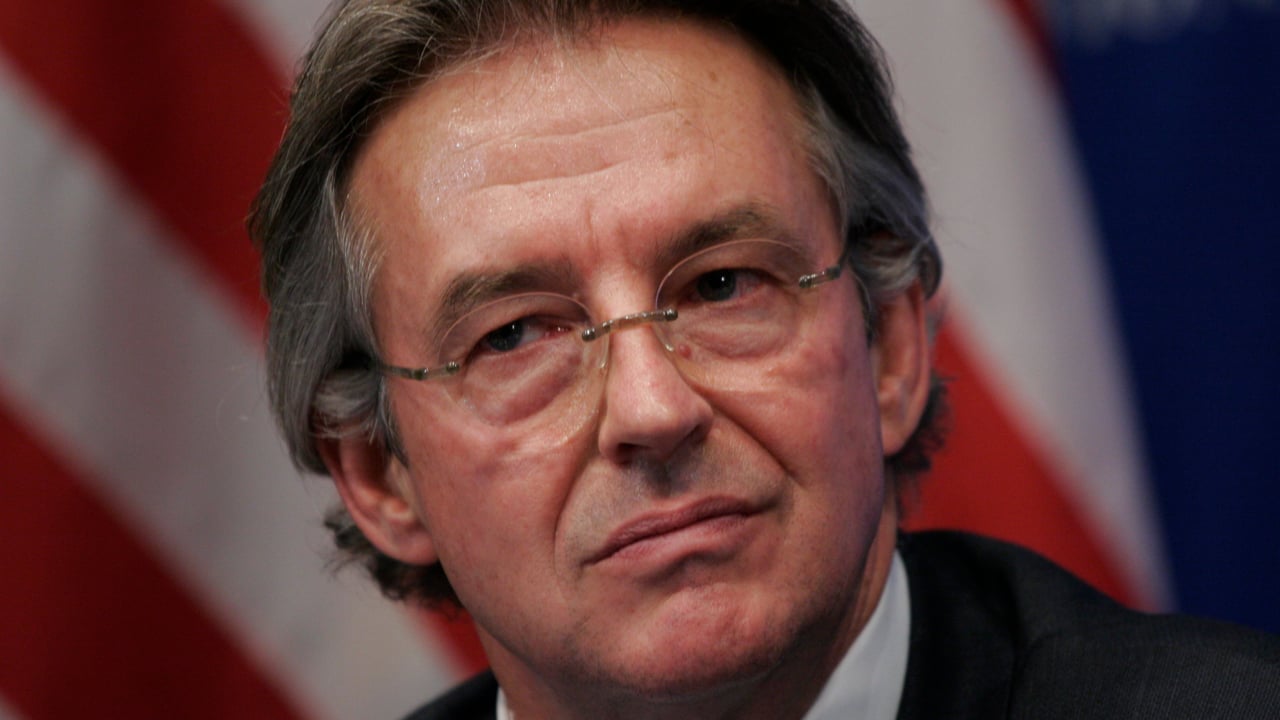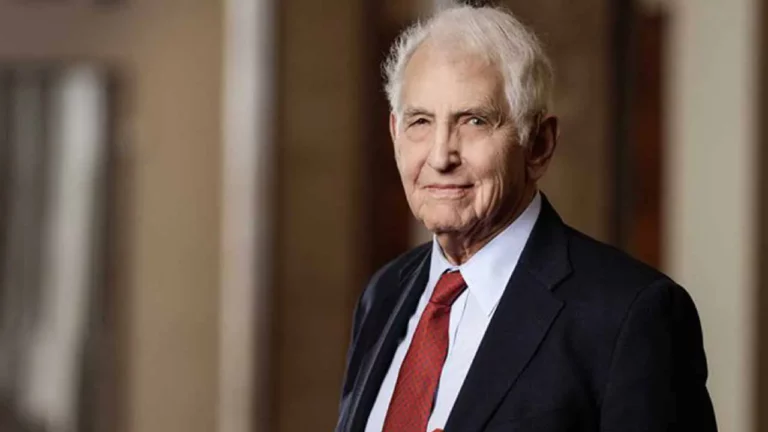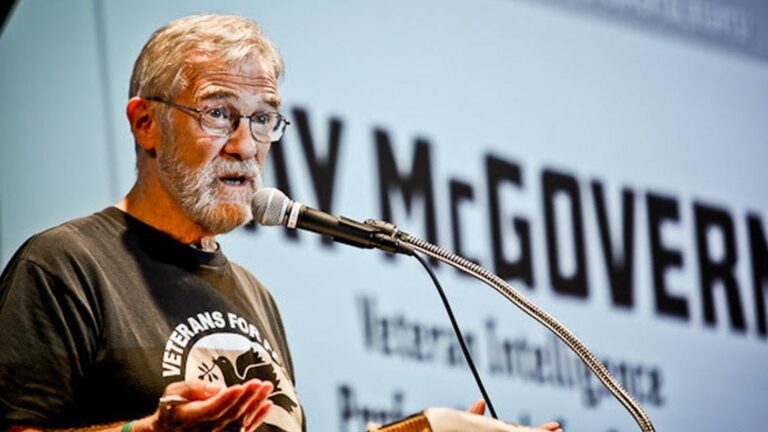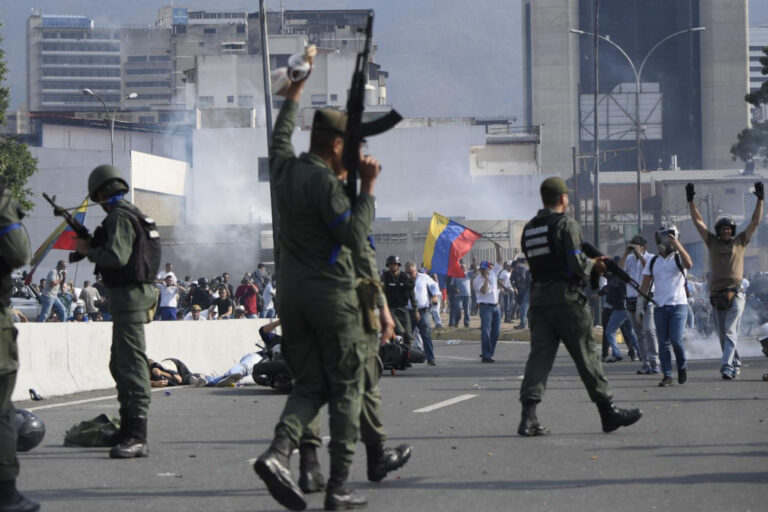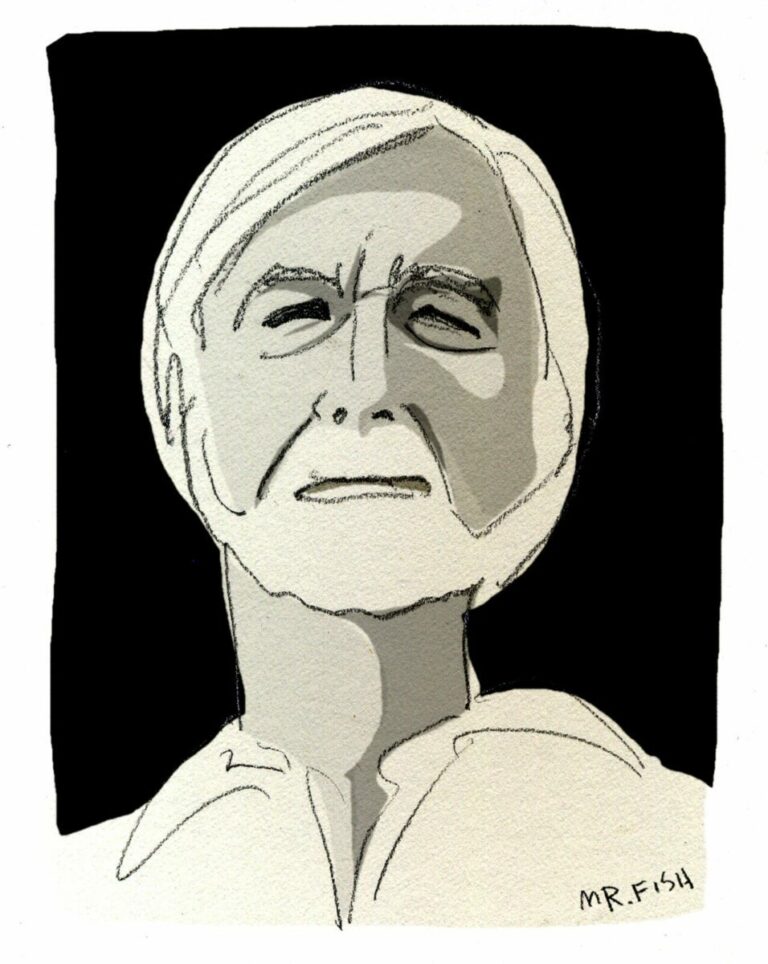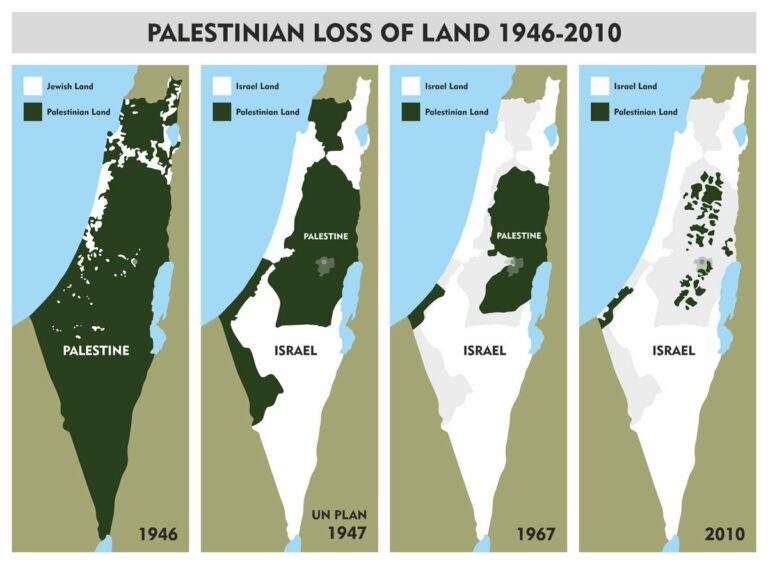A Warning of a Neocon Conspiracy – The Last Interview of Ambassador Joe Wilson (pt 1/6)
On Reality Asserts Itself with Paul Jay: In the last interview before his death in September 2019, Ambassador Joe Wilson says that a neocon conspiracy will use a compliant Trump in a march towards war – Watch out for a “war-time” President in 2020. Wilson’s wife Valerie Plame was outed as a CIA officer by VP Cheney’s office after Wison exposed lies that lead up to the Iraq War. The story was depicted in the movie “Fair Game”, Wilson was played by Sean Penn. PT (01/06)
Transcript
Paul Jay
Welcome back to Reality Asserts Itself, with Paul Jay. And this is theAnalysis. When I arranged an interview with Ambassador Joe Wilson, he said we better do it sooner than later. You told me that you’re dying. Joe was very ill and didn’t expect to live more than a few months.
Joe Wilson
It’s not so much as facing my mortality as getting ready to take that next step. In spite of that, he felt compelled to do the interview.
Paul Jay
He was extremely concerned that the same distortions and lies that led to the Iraq war were playing out again, this time targeting Iran.
Trump
Suleimani was plotting imminent and sinister attacks.
Paul Jay
He wanted to speak out against another illegal and more cataclysmic war.
Joe Wilson
We will regret every moment that we’re in there.
Paul Jay
Ambassador Wilson was a career diplomat for 22 years from 1976 to 1998. He started his career in Niger, a country he would return to in 2002 on a mission for the CIA, changed his life forever. From 1988 to 1991 he was deputy chief of mission at the US embassy in Baghdad, Iraq, and for his efforts there, President George H.W. Bush called him a true American hero. His 2002 mission Niger to investigate a possible Iraqi purchase of yellowcake uranium led him to find that such a transaction had not taken place. And he reported as much to the CIA.
Sean Penn
500 tons of yellowcake is not an off the book size transaction.
Paul Jay
According to The New York Times, Wilson told the CIA and the State Department that, “The information was unequivocally wrong and that the documents had been forged. This did not stop President Bush from stating what’s come to be known as the infamous 16 words in his 2003 State of the Union.
Bush
The British government has learned that Saddam Hussein recently sought significant quantities of uranium from Africa.
Paul Jay
This led Wilson to write a New York Times op-ed in 2003 titled, “What I Didn’t Find in Africa,” where he stated that, “Some of the intelligence related to Iraq’s nuclear weapons program was twisted to exaggerate the Iraqi threat.”
Cheney
This Joe Wilson was questioning our intelligence.
Paul Jay
The New York Times, the op ed, infuriated Vice President Dick Cheney as depicted in the movie,”Vice.”
Cheney
What’s his wife’s name again?
Paul Jay
In an act of retribution, it’s generally accepted that Cheney’s office leaked leaked information to Washington Post columnist, Robert Novak, that Wilson’s wife, Valerie Plame, was a CIA operative. This became a major scandal known as the “Plame-gate Affair.”
Valerie Plame
My name is everywhere, my real name.”
Paul Jay
–and was depicted in the movie, “Fair Game.” Sean Penn played Wilson.
Sean Penn
“We have to strike back. They’ll bury us if we don’t.”
Paul Jay
Well, Ambassador Wilson and I didn’t agree on everything, especially when we are now in the interview segments about the first Gulf War where Joe had been involved as a diplomat. You’re someone who has advocated, “This shouldn’t be the first response.”
Joe Wilson
and it wasn’t.
Paul Jay
Still, I think Wilson represents an important voice from the professional diplomatic community, many of whom see the foreign policy of the neo-cons and militarists in both major parties as dangerous to the U.S. and the world. I met with the ambassador in New Mexico, where he was then living in May of twenty nineteen. What follows is the last interview before Joe Wilson’s death on Sept. 27, 2019.
Paul Jay
First of all, thanks very much for doing this.
Joe Wilson
Welcome to Santa Fe. It’s a little bit of paradise.
Paul Jay
So, as viewers who watch “Reality Asserts Itself,” know, we usually start with a bio- biographical segment. But given what’s happening in the buildup, the arms around Iran right now and how much this seems to be a repetition of not just what led up to the war in Iraq, given the urgency, I thought we should start with where we are now and how we got here. And then the following segments, we’ll do more of the biographical.
Paul Jay
So you wrote in your book about the danger of what amounts to a neoconservative conspiracy. You talk about actual cells being formed and being placed in different parts of government, people being recruited into it. And you mentioned, specifically, the “Project of the New American Century,” and the document that came out, which was sort of this whole vision of a single superpower world that no longer had to pay any attention to international law. Talk about how that was the role that force played in terms of the Iraq war and what it might mean in terms of what’s happening now with Iran.
Joe Wilson
Sure. Well, the neoconservatives are a force that have been in the American foreign policy debate for as long as I’ve been in there. They basically got their start, as far as I can tell, in the mid 70s when George Herbert Walker Bush was head of the CIA and they were able to come up with, concoct this idea of a team B to go in and reassess the agency’s intelligence on the Soviets and where they were going. And then since then they were like the spawn of the devil. They are just spread—
Paul Jay
What does that mean, Team B? What was Team B supposed to do?
Joe Wilson
Team B was supposed to reassess, go back and look at all the intelligence and reassess whether the intelligence agencies had the correct assessment on Soviet capabilities. So they came up with sort of a separate assessment of how strong the Soviet Union was at that time, which was different from an incorrect, as it turns out, from what the intelligence community and its professionals had judged over the, over the years and over the decades. But that got them into government, that got him into the sort of, the politics.
Paul Jay
–and Team B, in your mind, exaggerated the Soviet threat.
Joe Wilson
Oh, yeah. Oh, totally. And they were absolutely wrong. And then you go back in and take a look at the record on that. A lot of them came out , interestingly out of, out of Scoop Jackson’s office when he was senator from Washington. That was their, that was their sort of place to sit on the hill. Pat Moynihan had a couple of them in his office, and then they’d been kind of in and around the U.S. government and various think tanks ever since. And during the time that we we did the debate on the, on the Iraq war. I knew all these guys, by the way, because they were all involved in the Gulf War.
Paul Jay
Who are some of the names?
Joe Wilson
Well, Richard Perle, Paul Wolfowitz, Doug Feith, John Bolton, the guy used to run the CIA, whose name escapes me. A guy who ran the Office of Special Plans at the Pentagon. So I think his name was Schultz. They all sort of came out of the University of Chicago. Albert Willsteader and a couple of his acolytes. And I can’t remember the guy who was, who was sort of the godfather of them all. But they were they were a force to be reckoned with. I knew them all from the Gulf War and they loved me then. You know, after all, I was the guy who was confronting Saddam Hussein. So when I came back, one of the first nights I was back in town, I was having dinner with Perle and Wolfowitz at Perle’s House.
And if you know anything about Richard Perle, quite apart from his rather interesting views on international relations, he’s also a pretty well-known crook. So he cooked a pretty nice dinner for me. And in the in the Iraq war, if I had taken a different position, I think they would have loved to have had me to be the poster child of the American return to Baghdad. I could have easily been Jerry Bremer if I’d taken a different position.
But I didn’t. And I stood up for what I believed in at the time and still believe in, which was opposing the invasion, which was my position on the Iraq war, I think, a little bit more subtle than just opposing the invasion. The case I tried to make was if you’re going to make this invasion, there’s got to be a strategic rationale for it. We’ve got to figure out exactly why we’re going to launch this war against a sovereign nation. And it can’t be just because we don’t like him. It’s got to be because he poses a real threat to us. And so you’ve got to demonstrate to me and to everybody else what that threat is in such a way that I understand.
Paul Jay
And if you go back to the Project for New American Century documents, it’s not about the threat. It’s about what you say in this interview with PBS Frontline. It’s about reshaping the Middle East as we like anduse force to do it.
Joe Wilson
A very aggressive militaristic policy will send our army anywhere to pursue the political objectives we decided upon. And it literally is, as Max Boot (?)couldn’t understand name quite correctly?) wrote in one of his more infamous articles. It really is this idea that somehow we can project jodphurs and pith helmets across the world.
Paul Jay
old 19th century, imperialist.
19th century, imperialist. And it didn’t end very well for the Brits. It didn’t end very well for the Russians. And it’s not ending very well for the Americans. And, and that’s really one of the points I tried to make. And that’s a point I would continue to make; that we really need to show some maturity and restraint in our approach to relations with other peoples, other cultures and other nations.
Paul Jay
Talk more about this idea of actually creating cells that they put into different elements of the state, different parts of the state.
Joe Wilson
Well, you can you, can see it even today where they they basically sprinkle their acolytes into various departments. So you had John Bolton over in the State Department. You had Feith and Wolfowitz over defense and they outflanked the rationalists, the realists in the foreign policy world. They were always there. They’re always pushing their agenda. And you can see it now as they’re pushing their agenda, and ‘way, ‘way into the process was Cheney. He was like the godfather of all of them. And it’s not clear to me. I kind of think Cheney was essentially a hack and they made Cheney. There are others who would say that that he rode them to where he ended up. But at the end of the day, I don’t think Dick Cheney was all that smart. And I think he was just basically a political guy who got used by these guys. And and he allowed them to shape the direction of of American international policy to the great detriment of our moral authority, our international leadership, our ability to really shape the environment around us.
And obviously, the repercussions are more than evident today with this clown we have in the White House. And the people around him. And, you know, Elliott Abrams is back running Venezuelan policy. I’ve known Abram’s since, since 1981 when he came in with Reagan. And these guys are just bad actors. They have an agenda that is different from the agenda that most Americans understand as our foreign policy priorities and our foreign policy responsibilities. And that agenda is, that agenda is very militaristic.
It is really to put our jodphurs and pith helmets around the world. And it is really just to impose our will without really understanding that in the real world, the world outside of Washington, you don’t impose your will. You try to negotiate for whatever advantage or mutual advantage you can get. The best secretary of state I ever worked for was with Jim Baker, and Jim Baker would never go into a meeting without fully understanding what the other side needed to get out of that meeting alive.
We don’t go into meetings concerned about what the other side, how the other side gets outside alive. We go into these meetings with the, with the distinct objective of imposing our will, whether we can impose our will on our interlocutors or not, and whether or not we can do so in a way that makes us both happy at the end of the meeting, or whether we just put our thumb or our net, our boot on their neck.
Paul Jay
The going back again to this neocon vision. Most of it’s in that project for New American Century documents. To a large extent, Iraq seemed to be a step towards Iran, and it really always seemed to be about Iran, although now it also seems to be really about China. Even Iran in terms of if you’re gonna have global hedgemony, and if you’re gonna control Middle East oil, you’ve got to deal with Iran. But other than that, why are they so fixated on bringing down the Iranian government?
Joe Wilson
Well, Michael Ledeen, who’s one of the one of the leaders of the neoconservative movement, once said, boys, go to Iraq, real men go to Iran. They’ve always been fixated on it. I think the reasons are really rather simple to understand. A lot of it has to do with ensuring Israeli security. And Hezbollah is financed and supported by Iran. Syria has, there’s a huge Iranian influence in Syria. So Iran is going to emerge as the big bogeyman to Israel and its sense of security. And we have bought into that in ways that I think, not just threaten our relationship in the region, our relationships in the region, but threaten our relationship with the other great powers with whom we negotiated the Iran agreement. The JCP(?) We find ourselves in trying to isolate Iran and we’re finding ourselves increasingly isolated. And it just makes no sense.
Paul Jay
You know, the hypocrisy of the quote, unquote moral argument when they make these critiques of Iran, much of which is true. But then why ally with Saudi Arabia, which is far more a sponsor of terrorism than anything Iran’s done? At the same time, the media’s hardly parses this at all. And sections of the leadership, the Democratic Party are on the same page. Chuck Schumer. There’s a lot of gathering forces to bring down the Iranian government.
Joe Wilson
if you want to understand the Middle East, you don’t read the American press to understand it. You meet, you read the press in the region. There is, there is a built-in bias. And I don’t know when or how we get over it. All I know is, it is if we send our troops into Iran, it’s going to be a really messy piece of business, and we will regret every moment that we’re in there.
Paul Jay
It seems the strategy is to create maximum psychological pressure, economic warfare against Iran, hope for civil war, destabilization of Iran, which seems to me leads to one of two things, either accidental breakout of real war between United States and Iran, and/or if the theocracy in Iran is really threatened with such complete chaos, they don’t go peacefully into the night.
Joe Wilson
No, there’s you know, there is in the Middle East, there was at least the residue of goodwill towards Americans in the United States that clearly has eroded to to a a dangerous point in Iran. I think even as recently as, maybe, five or six years ago, as recently as when we signed the agreement, the people to people relationship with the Iranian people had had every opportunity to flower. I think that’s gone now.
And I think you’re absolutely right. There they are. They will defend themselves just as we would if we were invaded. And anybody who thinks that that driving into Tehran, we’re going to be met with with kids and flowers and whatever Cheney said, we will get him that be met with in Baghdad, they ought to be thinking about what it would be like if foreign troops were invading New York City or Washington, D.C. and how we would feel.
And that’s where we are. And it’s just it’s not the way that you want to manage international relations in a recently, small globe populated by more and more people who need to figure out how to get along in this time of climate change, in all the other issues that we face as a as a species.
Paul Jay
When you listen to the Israeli intelligence and military security establishment, many of them have come out and said Iran is not an existential threat to Israel. Netanyahu loves having an existential threat to point to, especially as he’s facing corruption charges, but also trying to gather as much nationalist fervor to get reelected over and over again. But in some ways, even the more driving force seems to be the Saudis. What is this? The way the Trump administration and the neo-cons seem on the whole, mostly so in alliance with the Saudi monarchy. Talk about what you know about that.
Joe Wilson
Look, I’ve. I know the Saudis pretty well. I’ve never served there, but I’ve been there. And. And again, I guess what I would say is, if you want to understand the region’s politics, you’ve got to read the what the Middle East is saying about it. So when the Israelis are talking about Iran not being a problem, take that on board. Our relationship with the Saudis is outmoded and outdated and should have been modified a generation ago. But, you know, these relations end up being what they are. They become sort of settled. They become the way we deal with it. And we had some reason for many years to depend on Saudi oil. We don’t have that and don’t have to do that anymore. There’s no reason for us to be in the middle of their six hundred years squabble between the Sunni and the Shia. Other than to use our sort of diplomacy to try and get them to come to some sort of ecumenical peace so that they’re not in fact, they’re not going to effect blow up the world over who is the rightful heir to Mohammed. So how dangerous is this moment? Big military build up around around Iran. The war of words. Quite a fever pitch. I would say the chances of a major conflagration somewhere around the world in the next 20 months is is pretty high. And I think the most serious of threats, supposed, and those in the Middle East and in Iran.
Trump
Last night, at my direction, the United States military successfully executed a flawless precision strike that killed the number one terrorist anywhere in the world, Casem Salomene.
Joe Wilson
Kind of puts us so firmly with the Saudis against the Shia side of the Gulf. I just think it’s not in our interests, it’s certainly not the world’s interests. And and again, I think if you think it’s gonna be a cakewalk, it’s not. it’s not. The last time that I can recall that we did a war plan where we confronted Iranian troops in the Straits of Hormuz, where they had to cancel the war game because the Marine general who is running the Iranian side of the war game basically destroyed the American fleet in a matter of hours, twice
And they finally cancelled the war game because they were just so embarrassed that it might become public. And it’s just not going to be. It will disrupt oil supplies. It will pit us against the most radical forces within the Iranian regime because they will hold forth. It’s not the moderates, whoever rise to the top in times of war and peace. It’s always the most zealous. I used to say that in that part of the world, the moderates go out on Saturday and play golf.But the zealots are still plotting. And that’s what we need to worry about. We need to be encouraging the moderates and not giving the zealots their place in the sun.
Paul Jay
How much does this feel to you like the lead up to Iraq? And particularly I mean, there were so many voices in the days before the invasion of Iraq that said this is crazy, and this is going to turn into chaos. And what was predicted came to be. But they went in anyway and they were not that many voices.
Joe Wilson
I was there.
Paul Jay
I don’t mean inside the administration. I mean outside.
Joe Wilson
They were not even outside. They were not that many voices. It was a juggernaut. It was a neoconservative juggernaut. If you go back and you look at the debate, you’ll see maybe a half a dozen people who had had real standing to talk about these issues. And on the other side, you had everybody from the neo cons.
Paul Jay
You’re talking about a debate within the Beltway?
Joe Wilson
Within the debate, within the national debate, within the education, the American public about what was intended. There were not that many who were saying this is not a good idea.
Paul Jay
There were millions of people who hit the streets. They all know it.
Joe Wilson
Yes. But there were not that many people who had standing in the debate.
Yes. So a lot of people said war is a bad idea, but there were not a lot of people who could tell you why with the same sort of precision that General Scowcroft or myself, Tony Zinni, could.There were not very many of us who who were in that rather exalted position where you could be on all the talk shows.
Paul Jay
And for the Neo-Cons it wasn’t much of a debate in the sense that they had an agenda and they were imposing it. And is that what’s happening again?
Joe Wilson
Yes. And they have a president who is even more compliant than President Bush was in those days. And they have a team that’s pushing the agenda as quickly as they can. And again, we come up on an election year and, you know, the first six months of any war, you’ve got to support the president.
Paul Jay
Nothing like a wartime President.
Joe Wilson
It’s wag the dog. It’s really is. It’s. I think we’re looking at a really bad situation. I would liken it less to the Iraq war in 2003 and more to the guns of August and the couple of years leading up to World War One, because there is no real international moral authority. Our president is a clown. There is nobody in Europe who has any particular standing, particularly now that Miss Merkel is retiring. This is a drift to something. It could be really, really dangerous and deadly.
Paul Jay
All right. We’re going to continue our interview with Joe Wilson on Reality Asserts Itself.
Podcast: Play in new window | Download
